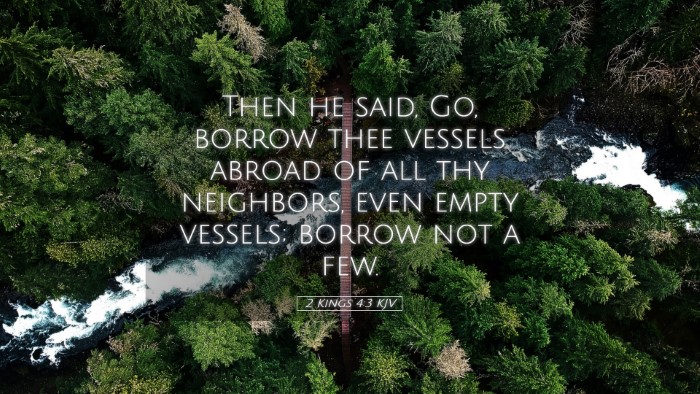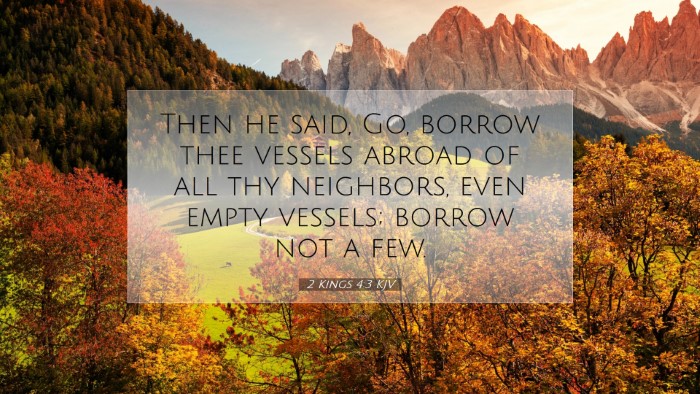Commentary on 2 Kings 4:3
Bible Verse: "Then he said, 'Go outside, borrow vessels from all your neighbors, empty vessels and not too few.'"
Introduction
The passage in 2 Kings 4:3 deals with the profound principles of faith, obedience, and divine provision as seen through the account of a widow who faces dire circumstances. This commentary synthesizes insights from notable public domain commentaries such as Matthew Henry, Albert Barnes, and Adam Clarke, targeting theological students, pastors, and scholars who seek a deeper understanding of this scripture.
Contextual Background
This narrative occurs during the ministry of the prophet Elisha, a successor to Elijah. The context is essential to grasp the dynamics of God's miraculous provision through the faithful actions of the widow, which illustrate a broader theological theme of reliance on God in times of crisis.
Historical Setting
The narrative takes place shortly after the death of the widow’s husband, who, as a prophet, left behind debts. The widow approaches Elisha, emphasizing her desperation. Understanding the socio-economic hardships within the Israelite community at the time, this story reveals the struggles of those who serve God faithfully while facing worldly challenges.
Verse Analysis
Exegesis of 2 Kings 4:3
Elisha's response to the widow is both practical and symbolic. The command to gather empty vessels is significant and reflects God's method of miraculous provision:
- Obedience and Faith: As highlighted by Matthew Henry, the widow's readiness to follow Elisha's instructions demonstrates her faith. Her act of borrowing vessels signifies an important spiritual principle: God honors faith-filled obedience, even in seemingly foolish tasks.
- Symbolism of Vessels: Albert Barnes notes that vessels in this context symbolize human receptiveness to divine grace. The empty vessels represent our own neediness and capacity to receive God's abundant provision.
- Community Engagement: The instruction to borrow from neighbors emphasizes the communal aspect of faith. Adam Clarke elaborates that the widow's need leads to a call for communal generosity, highlighting relational dependence within the body of believers.
Theological Insights
Divine Provision
The passage illustrates a key theological concept: God's provision often comes through unexpected means. As pointed out by Albert Barnes, the empty vessels signify our own emptiness before God, and in our need, He meets us. This leads to a profound realization that our lack is an opportunity for God's presence.
Faith and Works
Matthew Henry emphasizes the interplay between faith and actions. The widow had to actively seek out the vessels, highlighting that faith is not passive but requires action. This prophetic response connects to the New Testament theme of faith without works being dead (James 2:26).
Prophetic Authority
Elisha, as a prophet, plays a pivotal role in the widow’s deliverance. Adam Clarke notes that this highlights the significance of prophetic authority and its relationship with God’s provision during times of need, a theme prevalent throughout the biblical narrative.
Practical Applications
For contemporary believers, especially pastors and leaders, this text presents several key applications:
- Call to Faith: Just as the widow acted in faith, leaders are encouraged to guide communities towards collective faith actions in times of need.
- Encouraging Generosity: The need for communal support resonates in modern ministry contexts. This narrative serves as a reminder to foster a culture of generosity and support within congregations.
- Vessel Readiness: Emphasizing spiritual readiness, congregants might examine their receptivity to God’s gifts and how they might need to become more open vessels for divine blessings.
Conclusion
2 Kings 4:3 offers rich insights into the interplay of faith, need, and divine provision. Through the widow’s obedience and Elisha’s prophetic guidance, we are reminded of God's desire to fill our emptiness with His grace. The call to gather empty vessels serves as a universal invitation for believers to become participants in the overflow of God’s miraculous work in a world that often parallels the widow's struggle.


